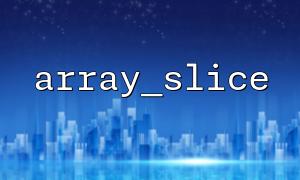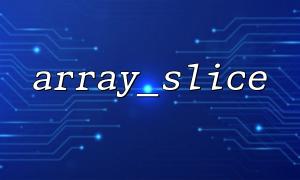In PHP development, array_slice is a very common array operation function used to intercept fragments of a specified length from an array. Its basic usage is simple and clear, but when faced with super large arrays, developers often care about its memory usage, especially whether it will cause a sharp increase in memory usage, which will affect program performance and stability.
This article will analyze the memory usage mechanism of the array_slice function in depth, and combine it with code examples to help everyone understand the performance of the function when processing super large arrays, and give some optimization suggestions.
array_slice(array $array, int $offset, ?int $length = null, bool $preserve_keys = false): array
$array : Enter the array
$offset : Starting position
$length : Intercept the length (optional)
$preserve_keys : Whether to retain the original array key name, it is not preserved by default (key names will be re-indexed)
array_slice will return a fragment of the input array, and the function itself will copy this part of the data to a new array to return.
When the array size is small, the memory footprint of array_slice usually does not attract attention. However, when facing a huge array of millions or even tens of millions of elements, the memory overhead of array_slice is worthy of vigilance.
array_slice does not reference or intercept the original array in place, but will copy the corresponding array part to generate a brand new array. This means:
If the original array takes up memory as X,
Snippets of length Y,
The returned new array will also consume approximately the same memory as the Y size.
So if the intercepted fragment is large, memory usage will double or even more (plus the original array).
<?php
// Simulate super large arrays
$largeArray = range(1, 10_000_000);
// Take out one million pieces of data in the middle of the array
$startTime = microtime(true);
$slice = array_slice($largeArray, 4_000_000, 1_000_000);
$endTime = microtime(true);
echo "Time-consuming interception:" . ($endTime - $startTime) . "Second\n";
echo "Original array memory:" . (memory_get_usage() / 1024 / 1024) . " MB\n";
// Access partial intercept results
echo "Slice the first element:" . $slice[0] . "\n";
?>
When you run this code, you will see:
The memory occupied by the script increases significantly (original array + slice array)
The execution time of the program has increased significantly compared to ordinary small array operations.
array_slice does cause a significant increase in memory usage when dealing with super large arrays because it copies the corresponding array data.
If the array data comes from a file or database, consider reading it step by step, or using a generator to process the data as needed to avoid loading all data at once.
If only a small part of the data is needed, the small fragments intercepted by array_slice take up less memory and have limited impact.
PHP's iterator interface (such as LimitIterator ) can achieve similar intercept-like effects without copying the array.
Example:
<?php
$array = new ArrayIterator(range(1, 10_000_000));
$iterator = new LimitIterator($array, 4_000_000, 1_000_000);
foreach ($iterator as $value) {
// deal with$value
}
?>
This avoids copying arrays and saves memory.
If you have to use array_slice to handle large arrays, make sure that the memory_limit of PHP's memory limit is large enough to avoid abnormal termination of the program.
The array_slice function copies array fragments when processing super large arrays, which will lead to a significant increase in memory usage. If you are facing arrays of tens of millions, it is recommended to consider using iterators or chunked reading to avoid memory bottlenecks and improve program performance and stability.
For more PHP skills, please visit https://gitbox.net/php-tips for the latest tutorials and practical experience.
Related Tags:
array_slice












